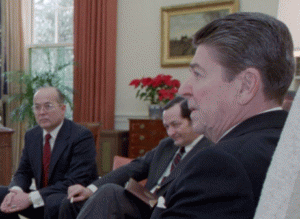From Consortium News
Declassified records from the Reagan presidential library show how the U.S. government enlisted civilian agencies in psychological operations designed to exploit information as a way to manipulate the behavior of targeted foreign audiences and, at least indirectly, American citizens.
A just-declassified sign-in sheet for a meeting of an inter-agency "psyops" committee on Oct. 24, 1986, shows representatives from the Agency for International Development (USAID), the State Department, and the U.S. Information Agency (USIA) joining officials from the Central Intelligence Agency and the Defense Department.
Some of the names of officials from the CIA and Pentagon remain classified more than three decades later. But the significance of the document is that it reveals how agencies that were traditionally assigned to global development (USAID) or international information (USIA) were incorporated into the U.S. government's strategies for peacetime psyops, a military technique for breaking the will of a wartime enemy by spreading lies, confusion and terror.
Essentially, psyops play on the cultural weaknesses of a target population so they could be more easily controlled or defeated, but the Reagan administration was taking the concept outside the traditional bounds of warfare and applying psyops to any time when the U.S. government could claim some threat to America.
This disclosure -- bolstered by other documents released earlier this year by archivists at the Reagan library in Simi Valley, California -- is relevant to today's frenzy over alleged "fake news" and accusations of "Russian disinformation" by reminding everyone that the U.S. government was active in those same areas.
The U.S. government's use of disinformation and propaganda is, of course, nothing new. For instance, during the 1950s and 1960s, the USIA regularly published articles in friendly newspapers and magazines that appeared under fake names such as Guy Sims Fitch.
However, in the 1970s, the bloody Vietnam War and the Pentagon Papers' revelations about U.S. government deceptions to justify that war created a crisis for American propagandists, their loss of credibility with the American people. Some of the traditional sources of U.S. disinformation, such as the CIA, also fell into profound disrepute.
This so-called "Vietnam Syndrome" -- a skeptical citizenry dubious toward U.S. government claims about foreign conflicts -- undermined President Reagan's efforts to sell his plans for intervention in the civil wars then underway in Central America, Africa and elsewhere.
Reagan depicted Central America as a "Soviet beachhead," but many Americans saw haughty Central American oligarchs and their brutal security forces slaughtering priests, nuns, labor activists, students, peasants and indigenous populations.
Reagan and his advisers realized that they had to turn those perceptions around if they hoped to get sustained funding for the militaries of El Salvador, Guatemala and Honduras as well as for the Nicaraguan Contra rebels, the CIA-organized paramilitary force marauding around leftist-ruled Nicaragua.
Perception Management
So, it became a high priority to reshape public perceptions inside those targeted countries but even more importantly among the American people. That challenge led the Reagan administration to revitalize and reorganize methods for distributing propaganda and funding friendly foreign operatives, such as creation of the National Endowment for Democracy under neoconservative president Carl Gershman in 1983.
Another entity in this process was the Psychological Operations Committee formed in 1986 under Reagan's National Security Council. In the years since, the U.S. administrations, both Republican and Democratic, have applied many of these same psyops principles, cherry-picking or manufacturing evidence to undermine adversaries and to solidify U.S. public support for Washington's policies.
This reality -- about the U.S. government creating its own faux reality to manipulate the American people and international audiences -- should compel journalists in the West to treat all claims from Washington with a large grain of salt.
(Note: You can view every article as one long page if you sign up as an Advocate Member, or higher).






